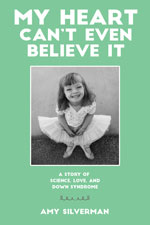
A Different Kind of “Momoir”: Should We Be Writing About Our Kids? Part Five
posted Friday July 30th, 2010
Robrt Pela is a dear friend and longtime colleague. If you live in metro Phoenix, you might know him as the theater critic for Phoenix New Times and KJZZ, the local NPR affiliate. He writes about other things, too — he’s done a book about John Waters, and New Times stories about every art form you can imagine (and some you can’t). And he writes about his own life.
Robrt’s memoir writing is fan-freaking-tastic, and I am particularly fond of the work he’s done about his family. He doesn’t write about his kids — he doesn’t have any. Lately, he writes about his mother. It’s a particularly bittersweet task, I imagine, because she he has Alzheimer’s.
It’s not the same as writing about your kids, and yet in some important ways, I think, it’s not entirely different, either. Robrt was kind enough to take a break from his almost round-the-clock caregiving role to answer a few questions.
(You can hear his pieces and see a lovely photo of Robrt and his mom on KJZZ’s archives.)
Before this happened with your mom, how did you approach memoir writing?
Much more cautiously. I felt more strongly about protecting people when writing about them as secondary characters in my own story. I worry about that less, now that I’ve written about my mother as a disabled person— something she would not have approved of.
Did you have any rules for what you would/wouldn’t write for the public?
I suppose, unofficially, that I meant not to embarrass people who were close to me. So stories in which others behaved badly were off limits. This is less often true all the time.
How is this different when it comes to your mom, given her situation?
I had to abandon the idea of only writing about things my mother would have approved of, were she still in her right mind, because she was a very private person when it came to anything embarrassing, like an ailment. She wouldn’t have approved any of this, to be honest, and that’s where my personal concerns about exploitation and fairness come in. When we’re writing about someone close to us, we’re writing about ourselves, as well. I was always profoundly moved that my mother’s mother’s lifelong confinement in a mental hospital in the 1920s was such a deep, dark secret. I hated that. By not keeping secrets, I am making up for the ways in which my maternal grandmother (whom I never knew) became a secret. For me, if I’m telling all my stories, without shame, I’m compensating.
You have already put some work out into the world — any regrets once it was there? Lessons learned from it?
I was frankly surprised by the response to the first Mom essay, and I suppose the lesson I learned is that everyone has a mother, and mom storiesnreally resonate with people.
I have no regrets.
Why write memoir?
I like writing what I know, and I suppose I know nothing better than my own story and how I feel about it. Also, writing memoir is a more intimate way of doing what we do all day long: write. It’s like having a discussion with your reader in which you say, “See? We’re different enough that you’re informed or (hopefully) entertained by this story, but we’re also kind of alike; this is your story, too.”
Why write about your mom during this time? Why not just tell happy stories about her?
I find that I can do both, but one has to have reason to write about what a good cook or friendly person one’s mother is or was. The contrast between who she is now and who she was before, in my case, provides a tension and melancholy that I like to bring to my writing.







Leave a Reply